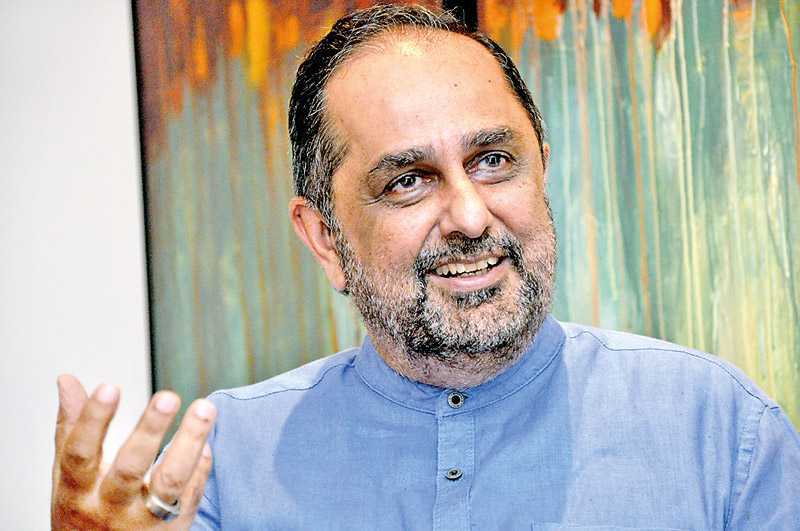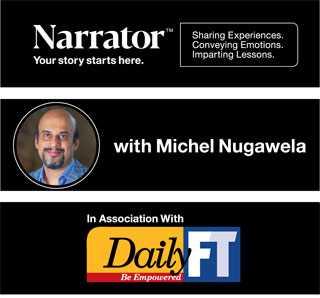Wednesday Feb 18, 2026
Wednesday Feb 18, 2026
Thursday, 19 November 2020 02:04 - - {{hitsCtrl.values.hits}}

Expolanka Holdings Executive Director and Group CEO Hanif Yousuf – Pic by Lasantha Kumara
 While CEOs and leaders focus on the future, we’re asking them to pause, reflect on the past, and share the single-most important lesson they have learned.
While CEOs and leaders focus on the future, we’re asking them to pause, reflect on the past, and share the single-most important lesson they have learned.
Our lives and careers are works-in-progress, and we will always learn more in the future than we know now, but what insights could our younger selves ̶ and other aspiring leaders ̶ embrace and act on right now to live a more positive, productive, and empowered life?
Michel Nugawela asks Hanif Yusoof, CEO, Expolanka Holdings, what one piece of advice he would give his younger self if he could travel back in time.
Advice to my younger self and all aspiring leaders: Be who you are. Understand what your strengths and competencies are, and use them to take you where you are meant to go.
I came from a family of wealth and success, a background of great comfort. My father died when I was very young. I was left with a mountain of business debt and also had to shoulder the responsibility of looking after my family. So I had to grasp every opportunity that came along to survive.
Together with my partners, I started so many businesses – in travels, travel cargo, tea, pharmaceuticals, poultry processing, a bakery – anything that looked interesting. The money we made paid off our debts and helped us survive. When the economy was liberalised in 1977/78, there were also many opportunities and everything seemed interesting to take on. You could say that I became a jack of all trades and a master of none – a statement that would prick me later on.
Advice to my younger self and all aspiring leaders: Avoid energy suckers who tell you that you can’t achieve. Listen to your inner voice, which says you are going to make it; you are going to reach your destination and stand out.
In 1985/’86, a Taiwanese company wanted to acquire my freight forwarding business. They were interested in strong single players in single countries, and I was a small player with a lot of potential. They knew I was a performer.
During the discussion, they told me, ‘People like you will be history; an irrelevance in the logistics business as the largest players acquire the smallest. There is no space for you in this landscape.’ It was a transformational statement. The entire industry was about global brands like the Schenker’s and Kuehne & Nagel’s. Small companies were being acquired by the big American, Taiwanese and Hong Kong logistics players. In the future, customers would no longer say they wanted to buy from Expo Lanka. Instead, they would choose one brand to handle their operations in every country.
But that remark really shook me; someone coming here and saying I was a small boy in Sri Lanka. The offer they made was tempting, but I refused.
Was it my ego that made me say no? Was it stubbornness? Was it my nationalistic Sri Lankan identity that made me say no? I’m not sure, but the statement got me to think. If they were talking about a global village, and I was refusing to sell, didn’t I need to rethink my business? I didn’t have the money to expand, I wasn’t as strong as they were, but I told myself, ‘If I become like them, I can buy companies similar to mine in other countries.’ I had followed the rise of the Birla and Tata Groups – if an Indian could do it, what was there to stop a Sri Lankan? I was determined to become a global player.
Advice to my younger self and all aspiring leaders: You might not be very successful at the start, but you will find your way. The journey of an entrepreneur is like walking in the woods. You have to find your way through the woods to arrive at your destination. You may wander all over, people may find you to be strange, you may get long along the way, but after some time, you will come to know the woods like the back of your hand.
From that moment, I made the decision to start thinking globally. First I aimed to be a great Indian subcontinent player. Once I achieved that, I wanted to be a great Southeast Asian player. I then expanded into the United States.
Somewhere along the way, a vague seed had also been planted in my mind; that you had to be Chinese to do business in China, a Hong Konger to do business in Hong Kong, that if you were from the Indian subcontinent, you had to stick to doing business there.
So I expanded to Mauritius first; I became the second largest operator in the country within five years, which gave me a tremendous boost of confidence. I thought to myself, ‘Who says I can’t do the same in Vietnam, Hong Kong, China, or India?’ It wasn’t easy at the start but I was successful because of the great relationships I cultivated with customers. Today I rank about 26th in the world and the Taiwanese company that wanted to buy me out is no longer in existence.
Advice to my younger self and all aspiring leaders: Use your core strengths and competencies to build relationships with people. Because in life, other people matter more than you; they are more important than you. If you help your customers grow, you will grow too.
When I was young I read books like Og Mandino’s ‘The World’s Greatest Salesman’ and Dale Carnegie’s ‘How to Win Friends and Influence People’. I learned that it’s people that make you grow. You are just an instrument.
It’s very important to focus on your strengths in life. Some of the businesses I started were can-do’s – they were possible to do, but not necessarily people-related. My core strength was to cultivate strong relationships. Relationships are very personal, and essential for a leader to develop and transmit. People who had met me only once knew that I was always contactable and delivered the goods. Even today, I maintain strong relationships from over 20 years ago.
If I was to expand globally, it meant that I had to give up all the other businesses I had invested in. It wasn’t easy, but I concentrated on building the logistics business, which I had personally founded and in which I had my natural strength – great relationships. My mantra was: if the customer grows, I grow. It was always about relationships.
Over time, as I coupled my strengths with the core business, I found customers would ask me: could you also help me in India? Vietnam? Cambodia? My strength in relationships was helping me to succeed. While the money didn’t come immediately, it materialised eventually.
It was never about extensive business plans, strategic thinking, budget forecasting, I never entered a market and planted a flag thinking the business would come – no, I was prepared to enter a new country on the basis of a relationship with someone who said he would give me business.
It wasn’t easy to present all of this to the Board – my instinct, my inner voice, advising me to enter a new country on the basis of a relationship. They would say, that’s great, but what’s your three- or five-year forecast? I would tell them I didn’t know, but I had a great relationship with this guy who said he was going to give me business! That was enough for me.
Advice to my younger self and all aspiring leaders: Look at your strengths and competencies and focus on them. Identify your strengths. Have you got the skill set to do it? Are you a technical person or a relationship person? What will help you take your business forward? Is it something that wakes you up in the morning? Does it make you joyful? If it doesn’t, don’t do it.